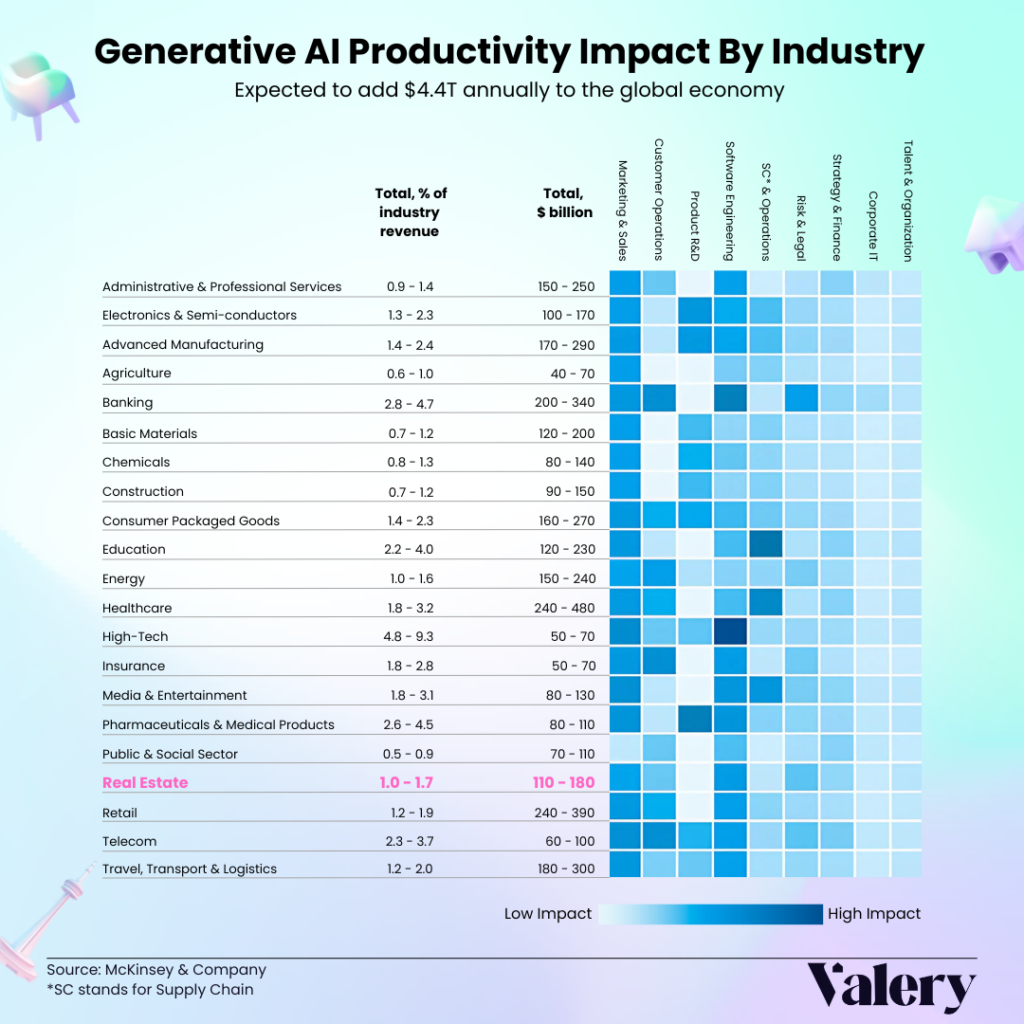The revolution of Artificial Intelligence, AI, in real estate has sparked widespread debates about its potential to either enhance or replace the role of real estate agents. From automating mundane tasks to providing data-driven insights, AI is reshaping the industry in unexpected ways. But does this mean the end of real estate agents? Or can these powerful tools be used to boost their efficiency and performance? Let’s explore how AI is transforming the real estate landscape.
Understanding AI in Real Estate and its Role in Today’s Market
AI technology, specifically, generative & data analytics AI, is already transforming the real estate landscape in numerous ways. For example, AI tools for real estate agents now assist with creating property descriptions, managing social media, producing AI-driven videos, property evaluations, providing virtual interior redesign, etc. Software like ChatGPT illustrate how AI for real estate is being used to boost efficiency and streamline workflows. These tools are invaluable to agents looking to save time on routine tasks, allowing them to focus on building client relationships.
What Can AI Do Better Than Realtors?
In certain areas, AI can outperform human agents. One of the main advantages is efficiency. AI can handle repetitive tasks like AI property valuations quickly and accurately by processing large datasets. This helps agents make data-driven decisions and analyze trends, which ultimately leads to more informed decisions for clients.
Moreover, AI tools for real estate agents can integrate various data sources—such as economic indicators, demographic information, and social media activity—into comprehensive reports. These insights offer a level of analytical depth that would be time-consuming for humans to replicate. Additionally, the emergence of free or low-cost AI tools makes it easy for real estate agents to access sophisticated technology without a hefty price tag.

The Strengths of Realtors That AI Can’t Replace
Despite AI’s impressive capabilities, there are areas where real estate agents excel beyond what AI can achieve. Human attributes like emotional intelligence and empathy are crucial in real estate transactions, especially during negotiations and relationship-building. Realtors are adept at reading non-verbal cues and adjusting their communication style to suit individual clients, which can make a significant difference in sensitive situations such as pricing discussions or handling objections.
Moreover, local market knowledge and community insights provide realtors with a competitive edge that AI lacks. Agents often have insider information on neighbourhood trends, upcoming developments, and the unique qualities of different communities – insights that are built through experience and personal connections. Buyers and sellers often seek a human connection and trust, which only a knowledgeable local agent can provide. This deep, personal understanding helps agents deliver a customised experience that goes far beyond what AI-driven algorithms can offer, reinforcing the essential role that realtors play in the industry.
AI as a Tool for Realtors, Not a Replacement
AI should be seen as a tool that empowers realtors rather than replacing them. AI tools for real estate agents can be utilized for content creation, negotiation support, and even coaching – helping agents be more productive and efficient. By taking over mundane tasks, AI allows realtors to concentrate on fostering client relationships. This blending of human touch with AI technology is paving the way for a more balanced and efficient approach to real estate.
How Fast is AI Advancing in the Real Estate Industry?
Since 2022, the real estate industry has witnessed a rapid expansion in AI capabilities. New tools such as Meta AI, Claude, and Gemini are released frequently, showcasing real estate market trends and beyond. Moreover, AI-driven platforms are now utilizing machine learning algorithms to refine pricing strategies and enhance marketing approaches, providing real estate professionals with valuable insights that were previously difficult to access. However, this swift evolution also raises concerns about job stability in the real estate sector as technology improves.
Can AI Replace Realtors Completely?
Although AI can streamline certain tasks, it is unlikely to completely replace realtors. Real estate involves not only transactions but also emotional processes that require human touch and empathy. For example, while AI home evaluation tools can provide quick assessments, they cannot replicate the personal guidance that a real estate agent offers. As a result, AI might transform specific aspects of the profession, but the need for realtors remains strong due to the inherently human elements of the job.
The Future of AI-Assisted Realtors
Adapting to AI is becoming increasingly essential for real estate agents who wish to stay competitive. Agents who embrace AI can leverage its strengths to improve their efficiency and stay relevant. Transparency with clients about the use of AI tools can further enhance trust, as customers appreciate the benefits of technology without feeling like they’re being managed by a machine.
The Importance of Trust and Empathy in Real Estate
Real estate transactions are deeply personal, and clients seek guidance from agents who can offer empathy and emotional support. Several case studies could easily show why buyers and sellers value human interactions during major decisions, underscoring the importance of trust in the agent-client relationship. These human elements cannot be fully replicated by AI, which is why realtors will always hold a unique place in the industry.
The Psychological Component of Real Estate Transactions
Buying or selling a home is an emotional journey that can trigger various anxieties. Realtors are essential in providing reassurance and helping clients navigate this process. While AI tools might save time, they cannot offer the emotional support and handholding (as of now) that realtors provide, which is often crucial for a satisfying real estate experience.
How AI is Reshaping Real Estate Marketing
How AI is changing the real estate industry is apparent in the evolution of marketing strategies. AI tools now facilitate property descriptions, targeted advertising, and even AI-generated videos, making it easier than ever for agents to reach potential buyers. Agencies are also using AI for image recognition to automatically tag and categorise property photos, allowing for faster and more relevant search results. Platforms like Zillow are leveraging AI to personalise home recommendations based on users’ browsing habits, which enhances user engagement. Another cutting-edge example is the use of AI-generated virtual tours, where buyers can explore a property from anywhere, complete with tailored decor options based on current design trends. This use of AI provides a dynamic, personalised experience that goes beyond traditional photo galleries, allowing buyers to envision themselves in a space before setting foot inside.
Are Realtors Prepared for the AI Revolution?
The integration of AI into real estate demands that agents continuously upgrade their skills. Those who are forward-thinking and willing to embrace AI tools can gain a competitive edge. This will involve training to use AI effectively and adapting to new technologies as they emerge. Embracing AI not only enhances an agent’s marketability but also positions them to deliver better service.
Will AI Speed Up the Home Buying Process?
AI in real estate has the potential to make the home buying process more efficient by streamlining paperwork, automating communication, and even assisting with mortgage pre-approvals. AI chatbots, for instance, can respond to buyer inquiries instantly, providing quick updates and keeping the process moving forward without delays. Additionally, tools like AI home evaluation can deliver faster, data-driven assessments, enabling buyers to make informed decisions more rapidly.
-However, while AI may cut down on time-consuming tasks, there is a concern that it could also diminish the personal touch clients seek during such a significant transaction. Many buyers still value the reassurance and guidance that a real estate agent provides, particularly when navigating complex or emotional aspects of a purchase. Therefore, finding the right balance between efficiency and human connection will be essential as AI tools for real estate agents continue to evolve.
How AI is Reshaping Realtor-Client Interactions
AI, through chatbots and other tools, can significantly improve customer service by providing quick responses and addressing client inquiries. Yet, a fundamental question remains: Will AI take over real estate agents or simply assist them? The future will likely involve a blend of AI-driven tools and human expertise, where agents use technology to enhance their client interactions without entirely replacing the personal element.
Conclusion: Realtors and AI – Partners in the Future of Real Estate
In conclusion, AI in real estate should not be viewed as a threat to agents but as a tool that can elevate their performance. By leveraging AI, real estate agents can improve their services, increase efficiency, and ultimately provide a better experience for their clients. As technology continues to evolve, realtors who adapt and embrace AI will be well-positioned to thrive in this new era of real estate.
FAQs
1. How is AI used in real estate?
AI is used to automate tasks such as property descriptions, managing social media and customer service. Additionally, AI property valuation tools allow for efficient and accurate property assessments.
2. Will AI make real estate agents obsolete?
While AI will transform certain aspects of the role, it is unlikely to replace real estate agents entirely. The human element remains crucial in building trust and empathy with clients.
3. Can AI help new realtors succeed in the industry?
Absolutely! AI tools for real estate agents can help new agents streamline their processes and focus more on building client relationships and gaining local market knowledge.
4. What are the benefits of AI in real estate for homebuyers?
AI offers benefits such as faster transaction times and more accurate property valuations, which ultimately create a more efficient and informed buying experience.
5. How is AI changing the real estate industry?
AI is making real estate more efficient through automation and data-driven insights, while also transforming marketing, customer service, and property evaluation.
6. What are the risks of relying too much on AI in real estate?
Over-reliance on AI could result in a loss of personal connection with clients. Balancing AI with human interaction will be essential for long-term success in real estate.
